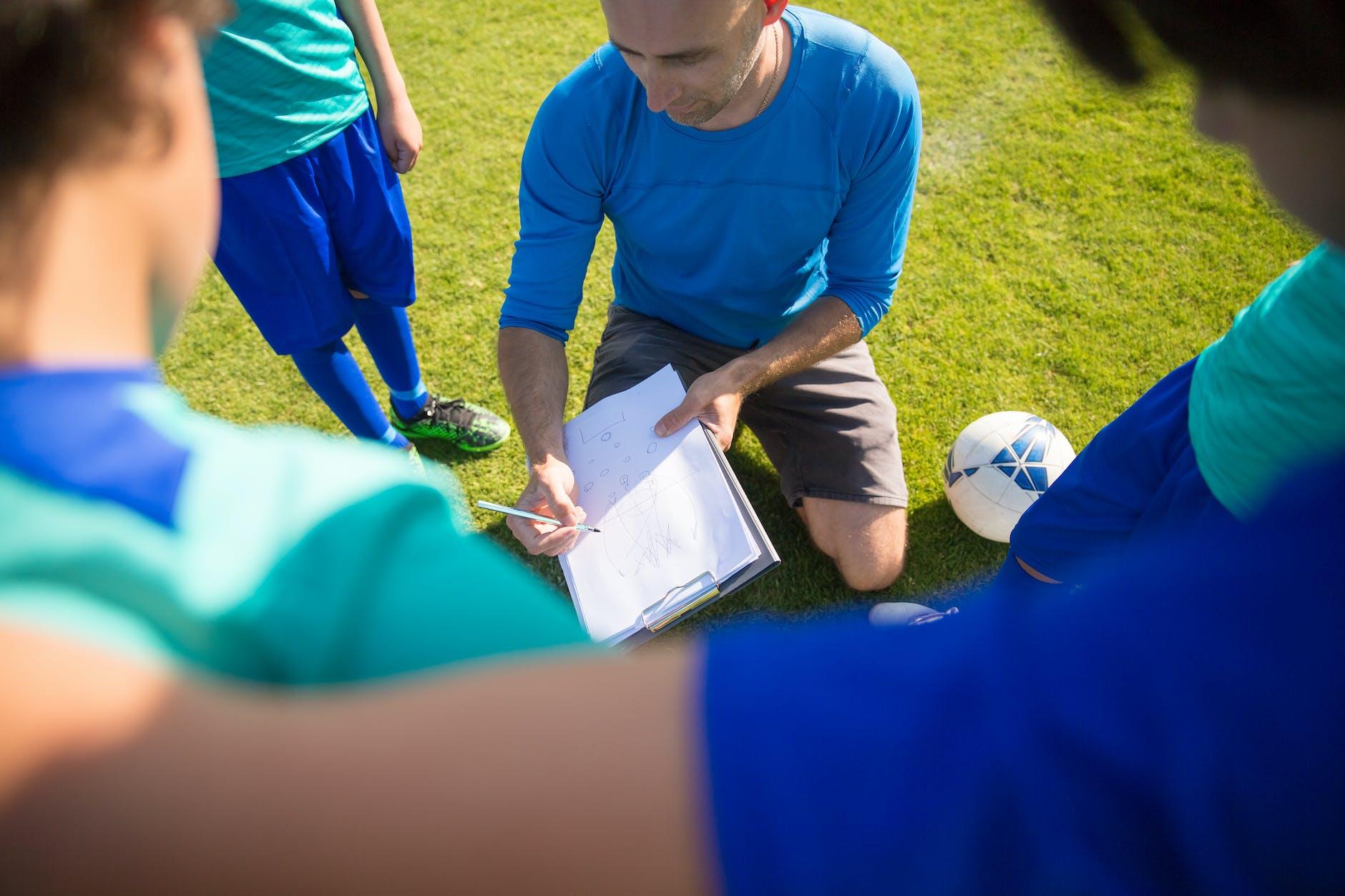Building a winning mentality in a football team is a complex football coaching procedure that goes beyond technical skills and tactical prowess. It involves educating a mindset that fosters consistent success, resilience in the face of difficulty, and a commitment to continuous improvement.
From my own experience, I can tell you how crucial a winning mentality is for a football team. When I coach a team, I know that talent alone isn’t enough. I start focusing on building player’s confidence and fostering a never-give-up attitude. We celebrate every small win, like improving our passing accuracy or showing great teamwork during practice. These little victories add up, and soon, the players start to believe in themselves and each other. This belief will transform their gameplay; they start winning more matches because they know they can. It is amazing to see how a positive mindset can make such a huge difference.
This article explores the essential components and strategies for building a winning mentality in football teams, emphasizing leadership, goal-setting, team cohesion, positive culture, resilience, confidence, discipline, continuous improvement, and overcoming adversity.
Table of Contents
Disclosure: Please note that some of the links below area affiliate links and at no additional cost to you I will earn a commission. Know that i only recommend products services and brands i have personally used and stand behind. When you use one of my affiliate links, the company compensates me, which helps me run this blog and keep my in -depth content free of change for readers (like you). Read our disclosure for more info.

Elevate Your Coaching Journey
Are you ready to take your coaching career to the next level? Look no further than FootballCoach365, your ultimate destination for top-notch coaching material.
Join the Coach’s Corner today and experience the transformative power of proper planning, training and coaching.
Understanding the Winning Mentality
Definition of a Winning Mentality
A winning mentality in football is characterized by a deep-rooted belief in achieving success through dedication, persistence, and a relentless pursuit of excellence. It’s not just about winning matches but also about consistently searching for improvement and overcoming challenges. Players and coaches with a winning mentality approach every training session, match, and competition with the mindset that they can achieve their goals through hard work and resilience.
Psychological Foundations
- Positive Thinking: Positive thinking is fundamental to maintaining optimism, resilience and build a winning mentality. It involves focusing on solutions rather than problems, which helps players and teams bounce back stronger from setbacks.
- Self-Efficacy: Self-efficacy or self-confidence refers to an individual’s belief in their ability to perform specific tasks and achieve goals.
- Mental Toughness: Mental toughness enables great players to stay focused, motivated, and composed in challenging situations. It involves managing emotions, maintaining concentration, and bouncing back quickly from setbacks. An example of mental toughness is a goalkeeper who remains calm and focused during a penalty shootout or after a mistake that caused a goal against his team, making crucial saves despite the pressure.

Carlo Ancelotti’s winning mentality is legendary in the world of football. Known for his calm behavior and tactical brilliance, Ancelotti has led teams like AC Milan, Chelsea, Real Madrid, and Bayern Munich to numerous titles. The Italian coach’s approach emphasis is in building strong, trusting relationships with players, instilling confidence, and maintaining a balanced, composed attitude even in high-pressure situations. The Ancelotti’s ability to adapt his strategies to different teams and environments, coupled with his unwavering focus on excellence, has cemented his reputation as one of the most successful and respected managers in football history.
The Role of Leadership
Importance of Strong Leadership
Effective leadership is crucial for building a winning mentality within a football team. Leaders set the tone, inspire teammates, and provide direction both on and off the field. They create a culture of accountability, resilience, and continuous improvement.
Characteristics of Effective Football Team Leaders
- Confidence: Confident leaders inspire belief and provide assurance to their teammates. They lead by example and demonstrate a strong belief in the team’s capabilities
- Communication: Effective communication is essential for conveying goals, strategies, and expectations clearly. It ensures that every team member understands their role and responsibilities. A coach who communicates tactical adjustments clearly during halftime inspires confidence and unity among players.
- Empathy: Empathetic leaders understand their teammates’ perspectives, motivations, and challenges. They build trust and cohesion by supporting and connecting with players on a personal level. For instance, a captain who listens to teammates’ concerns and offers support fosters a supportive team environment.
- Decision-Making: Leaders make timely and informed decisions, especially under pressure. They analyze situations, weigh options, and act decisively to guide the team towards success. A coach who makes bold substitutions that positively impact the game demonstrates effective decision-making. During the 2014 World Cup quarter-final match between the Netherlands and Costa Rica, Dutch coach Louis van Gaal made a bold and unconventional decision. As the game headed into a penalty shootout, he substituted starting goalkeeper Jasper Cillessen with Tim Krul. Krul, known for his penalty-saving skills, justified the switch by saving two crucial penalties, helping the Netherlands secure a spot in the semi-finals. This move showcased van Gaal’s strategic planning and reinforced the importance of making decisive, sometimes unexpected, decisions to secure victory.
- Motivation: Coaches who are motivational leaders inspire and encourage their players through positive reinforcement, recognition of achievements, and fostering a competitive yet supportive team environment. During Jesse Marsch’s halftime talk with RB Salzburg against Liverpool, he passionately urged his players to play with more intensity and belief, highlighting their potential to turn the game around despite being 3-1 down.
This is not a f*cking friendly!
Jesse Marsch
Half-time talk speech at Anfield for the Champions League Game of RB Salzburg against Liverpool on 2nd of October 2019.
Setting Clear Goals
Importance of Goal-Setting
Clear goals provide direction, motivation, and a benchmark for success. They help teams stay focused, track progress, and work together towards achieving common objectives.
Short-Term Goals
Short-term goals are immediate objectives that contribute to long-term success. They can include improving specific skills, winning upcoming matches, or achieving fitness targets. Achieving short-term goals boosts team morale and confidence.
Long-Term Goals
Long-term goals are overarching objectives that guide a team’s vision and aspirations. Examples include winning championships, qualifying for tournaments, or establishing a distinctive playing style. Long-term goals require sustained effort, dedication, and strategic planning.
MARCELO BIELSA – ATTACKING TACTICS AND SESSIONS

Learn from one of the most respected and admired coaches in modern football
- Exciting and Expansive Attacking Tactics
- High Tempo Football
- Constant Off the Ball Movements
- Moving the Ball to the Free Player via Link Players
- Creating Numerical Advantages in Key Areas of the Pitch
- Quick Combination Play
- Constant Pursuit to Exploit Potential Gaps and Spaces
Building Team Cohesion
Team cohesion is essential for maximizing collective potential and peak performance and create a winning mentality. It involves trust, unity, and effective communication among teammates on and off the field.
Strategies for Enhancing Team Cohesion
- Team-Building Activities: Engaging in regular team-building exercises, such as group challenges, retreats, or social events, promotes bonding and camaraderie among players.
- Communication: Open and transparent communication fosters trust and understanding within the team. It encourages players to share ideas, concerns, and feedback constructively. Team meetings where players are encouraged to voice their opinions on tactical approaches promote teamwork and unity.
- Shared Purpose: Establishing a common purpose and shared goals aligns team efforts and motivates players to work together towards achieving collective success.
- Support and Encouragement: Creating a supportive environment where teammates encourage and uplift each other contributes to a positive team culture and enhances cohesion. Players supporting a teammate who is returning from injury demonstrate solidarity and foster a supportive team atmosphere.
- Clear Roles and Responsibilities: Clarifying roles, responsibilities, and expectations ensures that every team member understands their contribution to the team’s success. It promotes accountability and unity. Assigning specific leadership roles within the team, such as a vice-captain responsible for team morale, clarifies responsibilities and enhances cohesion.

Creating a Positive Culture
A positive team culture promotes unity, resilience, and sustained performance. It values integrity, respect, and continuous improvement, fostering an environment where players thrive and succeed.
Methods to Develop a Positive Team Culture
- Respect and Integrity: Cultivating a culture of respect, fairness, and integrity creates a foundation of trust and mutual respect among teammates, coaches, and staff. A team that upholds fair play and respect towards opponents exemplifies positive sportsmanship and reinforces a positive team culture.
- Shared Values: Establishing and upholding core values such as discipline, hard work, and sportsmanship reinforces team identity and unity. For example, a team that emphasizes hard work during training sessions and fair play during matches builds a reputation for integrity and unity.
- Celebration of Success: Recognizing and celebrating individual and team achievements reinforces positive behaviors and motivates players to strive for excellence. A team that celebrates milestones, such as a player reaching a century of appearances or a debut by a youngster, boosts morale and reinforces a culture of success.
- Openness to Feedback: Encouraging feedback and constructive criticism promotes growth, learning, and continuous improvement within the team. Coaches who ask input from players on tactical adjustments after matches demonstrate openness to feedback and foster a culture of collaboration and improvement.
- Adaptability and Resilience: Emphasizing adaptability and resilience helps players navigate challenges, setbacks, and changes effectively. It encourages innovation and problem-solving.
Developing Resilience
Resilience enables teams to bounce back from setbacks, learn from failures, and maintain focus on long-term goals. It involves mental toughness, adaptability, and a growth mindset.
Encouraging a Growth Mindset
A growth mindset emphasizes learning, development, and continuous improvement. Coaches can foster a growth mindset by encouraging players to embrace challenges, learn from mistakes, and seek opportunities for growth. For example, a coach who emphasizes the learning opportunities from a defeat and encourages players to identify areas for improvement cultivates a growth mindset within the team.
Supporting Mental Health
Supporting players’ mental well-being is crucial for resilience and performance. Providing access to mental health resources, stress management techniques, and a supportive team environment helps players manage pressure and maintain mental clarity. For instance, offering workshops on stress management techniques or providing access to sports psychologists equips players with tools to enhance their resilience and mental well-being.
Building Resilience through Training
Incorporating resilience-building activities into training sessions, such as simulated pressure scenarios, physical challenges, and team-building exercises, prepares players to handle challenges and perform under pressure. For example, designing a small-sided game where a team starts the game losing 2-0 and has 10 minutes to win the game.
Fostering Confidence
Confident players demonstrate belief in their abilities, take calculated risks, and perform at their best under pressure. Coaching staff play a vital role in building and maintaining players’ confidence through positive reinforcement, encouragement, and creating a supportive team environment. Confidence will raise the level of performance and enforce team’s winning mentality.
Instilling Discipline and Accountability
Discipline is essential for maintaining focus, adherence to team values, and consistency in performance. It instills habits of hard work, commitment, and accountability among players.
Establishing clear expectations, roles, and consequences promotes accountability within the team. It encourages players to take ownership of their actions, learn from mistakes, and strive for continuous improvement. For instance, implementing a system where players review their own performances and set personal development goals fosters accountability and discipline.
Focus on Continuous Improvement

Continuous improvement involves reading and studying other teams and coaches, having a personal mentor, evaluating and adjusting strategies, both individually and collectively, to enhance performance, achieve long-term goals, and establish a winning mentality. It involves a commitment to learning, adapting, and refining skills and tactics.
- Implementing Feedback Loops: Feedback loops are essential for identifying strengths, weaknesses, and areas for improvement. Coaches can establish feedback mechanisms such as video analysis sessions, performance reviews, and individual meetings to provide constructive feedback and support players’ development.
- Utilizing Data and Technology: Incorporating data analytics and technology into training and match preparation enhances decision-making and performance optimization. Analyzing metrics such as passing accuracy, distance covered, and opponent analysis provides valuable insights for tactical adjustments and athlete development.
- Adapting to Tactical Trends: Football tactics evolve constantly, requiring teams to stay abreast of tactical trends and innovations. Coaches can adapt strategies based on opponent analysis, tactical developments, and game situations to gain a competitive edge.
- Developing Technical Skills: Technical skills are foundational for executing actions effectively under pressure. Players should focus on mastering fundamental techniques such as dribbling, passing, shooting, and defending through deliberate practice and repetition.
- Building Physical Fitness: Physical fitness is crucial for maintaining endurance, speed, agility, and strength throughout the season. Coaches should design training programs that incorporate aerobic conditioning, strength training, speed drills, and flexibility exercises tailored to football-specific demands.
- Strengthening Team Bonding: Strong interpersonal relationships and team chemistry foster trust, cohesion, and unity among players. Coaches can organize team-building activities, bonding sessions, and social events to strengthen relationships and cultivate a supportive team environment.
- Emphasizing Mental Preparation: Mental preparation is essential for maintaining focus, managing stress, performing under pressure during matches and build a winning mentality. Coaches can incorporate mental skills training techniques such as visualization, positive self talk, mindfulness, and goal-setting to enhance players’ mental toughness and resilience. For instance, guiding players through visualization exercises to mentally rehearse match scenarios or teaching relaxation techniques to manage pre-match nerves prepares players mentally and emotionally for competition.
- Encouraging Individual Responsibility: Fostering a sense of individual responsibility encourages players to take ownership of their roles, actions, and contributions to the team’s success. Coaches can empower players by delegating leadership responsibilities, setting expectations for personal accountability, and encouraging initiative both on and off the field.
- Promoting a Growth Mindset: A growth mindset encourages players to accept challenges, persist through setbacks, and view failures as opportunities for learning and improvement. Coaches play a pivotal role in nurturing a growth mindset by providing constructive feedback, emphasizing effort and resilience, and celebrating progress and achievements.
Conclusion
Instilling a winning mentality in a football team requires a comprehensive approach that addresses psychological, tactical, technical, physical, and interpersonal aspects of player development and team dynamics. By emphasizing leadership, goal-setting, team cohesion, positive culture, resilience, confidence, discipline, continuous improvement, and overcoming adversity, coaches can create an environment where players thrive, excel, and consistently strive for excellence on and off the field.
Building a winning mentality is not just about winning matches but also about nurturing a mindset that accepts challenges, learns from experiences, and relentlessly pursues success. Through dedication, persistence, and a commitment to growth, football teams can cultivate a winning mentality that transforms individual performances and fosters collective achievement and success.

